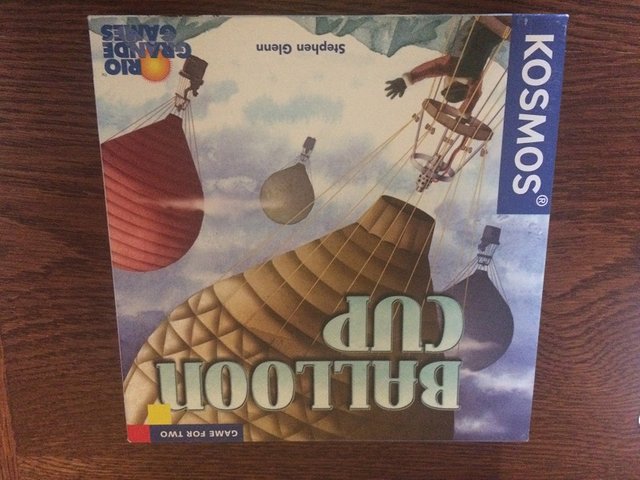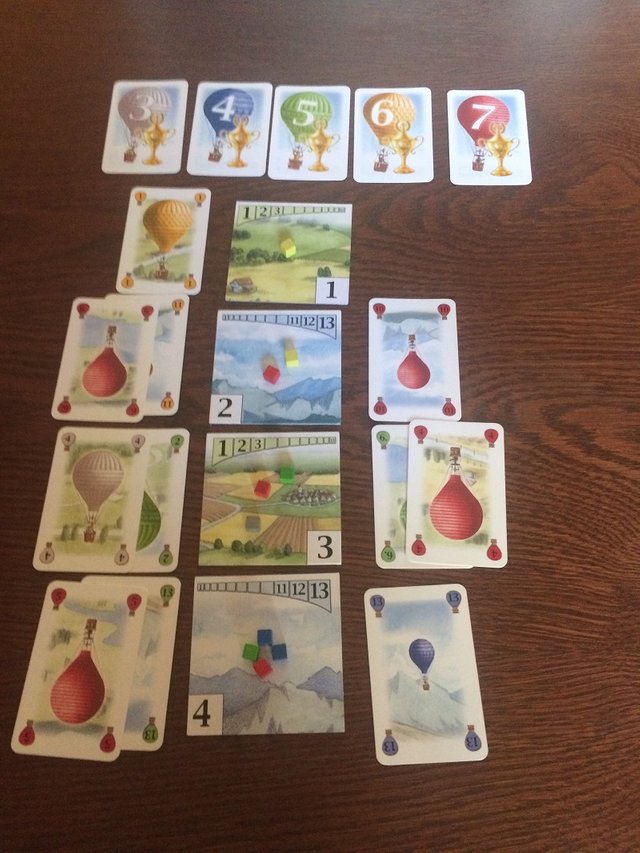Board Gaming - Balloon Cup
Balloon Cup

This short 2 player game takes on a race feel as each of you try to complete legs of between 1 and 4 cards on each side. How many cards a leg needs depends on how many cubes are on it, and the colour of the cubes also represents what colour cards need to be played to each side.
One of the fun parts of the game is that strategy of where to play, and on which side of the leg. Do I use a low card on my side of this leg that needs a low total, or a high one on the other side of it? You also have to decide which colour cubes to focus on, since there are 5 colours, but the winner only needs to take a majority of 3 colours, and with the the smallest colour only having 5 cubes, getting enough of them can happen quickly. The largest colour has 13 cubes, but because there's so many of them they can appear quite often too.

part way through a game, left player is likely to claim either of the top 2 legs by playing to the right depending on how good their yellow card is
I have a bit of fun with this game, and 15 years after it was released I still enjoy it as a quick little strategy game. It takes 30 minutes, but can be quicker if the cubes fall the right way.
Last 10 Board Gaming Posts
7 Wonders
Timeline: Diversity
Betrayal at Baldur's Gate
Isle of Skye
Ankh-Morpork
Stone Age
Tiny Epic Galaxies and Roll Player
Codenames, Star Fluxx and Coup
Ticket to Ride: Europe
Clank and Tiny Epic Quest



Donations still being accepted - Sponsor me here
Shout out to Jagged for his generous donation. Thanks a lot
There is something that I feel is very wrong in this game:
if you can play the balloons on either side, why the middle cards even have two sides? (getting higher numbers or getting lower numbers) one of them is always enough and changes nothing in the game mechanics, as players can play on either side.
Well without the cards (tiles) in the middle, you wouldn't know if you were needing to be the higher total or the lower total to win it's cubes.
When I say you can play on either side, the choice is that one side is your side, and the other is your opponents. So if you need to have a higher total, dropping a 1 or 2 on their side is likely to be disappointing to their chances of winning, likewise with needing a low total and your opponent plays a 12 or 13 on your side it really makes it tough to win that location.
So on your turn you really have to decide if you're better off playing a good card on your side, or a bad one on their side. Which often depends on the cards in your hand
the question is, why you need some tiles to be higher and some tiles to be lower?
(Unless I missed something critical in the rules, even after playing this game 20 times,) I claim the game is Mathematically equal having the tiles flipping (normal rules), or having them all higher wins, or having them all lower wins.
Mathematics aside, the confusion element created by the 2 sides of the tiles, have affect on my gameplay, which I wish that game didn't have 😞
I see I misunderstood what you were asking.
I guess the designer liked the idea of having some variation. It also gives a second decision making process when you have very high or very low cards in hand.
Example - There's a tile that is about to be scored with 1 more card played on it. It needs low currently, and the opponent has the 1 space on their side. Do you play your 13 on it, even though you'd win regardless of what's played, or do you keep it for after it's flipped (and hope the right colour cube turns up on it)
I've never found the process of scoring, flipping, adding cubes to a tile, and playing on to be confusing at all, but I do get the point that the game can feel a bit mechanical regarding the choice of where to put the card being obvious, but you don't have 1 card, you have 7. And it's only mechanical when there aren't options of what you play.
I've never played with either always high or always low, but sometimes during the game getting the 2 low ones to flip so everything is high can be useful if you've got a fist full of high cards. Likewise for going low when all you seem to draw is below 4.
My point is that the tiles side (score on low OR score on high), doesn't add any decision making.
This is because you can place cards on either side.
"Placing high cards on right benefit me and placing low cards on left benefit me" is symmetric to "Placing low cards on right benefit me and placing high cards on left benefit me". The only difference is the confusion caused between the two.
I think the sides of the tiles are remanent of the earlier game designs, when 'you couldn't place a card on the opposite side', and/or maybe 'couldn't place a card on the opposite side unless your side is already full'.
Quite possibly, or it could just be that this was a mechanic that the designers thought was a worthwhile addition to their game. I personally like the additional choices that it gives me, and have certainly used it to my advantage.
But like most things, No matter how a game is designed, it's not going to work for everyone. I still find it a nice 2 player game, especially if you want something to fill in between longer games or while you wait for others to arrive
Hello there!
This post has been upvoted as a thank you for supporting @sexywhalebot.
Have a sexy and profitable day! : ]